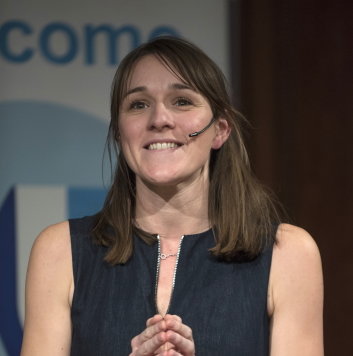Delft Technology Fellowship for Eline van der Kruk and Sabina Caneva
More outstanding female academics with a tenure track position – that is one of TU Delft’s most important pillars. The Delft Technology Fellowship (DTF) was introduced to help achieve this aim. Eline van der Kruk and Sabina Caneva are two top-level scientists who have been given positions at the 3mE faculty. This year, eleven fellowships were granted.
Eline van der Kruk
Eline van der Kruk is a scientist working in biomechanics and an expert in the field of sports engineering. Her research focuses on the development of models that will help optimise people’s (sports) movements. What is optimal movement? Van der Kruk explored this question among skaters for her doctoral research. During her stay at Imperial College in London, where she received an appointment after obtaining her doctorate, she carried out research on the limits of the human body in the elderly.
'The human body is “over-dimensioned”. In other words, we can perform movements in many different ways. Just think of the different speeds at which we can move on foot, from strolling to sprinting, or the different ways we can get up from a chair. We can also use different combinations of muscles for the same movements. We usually don’t give it much thought, but if you have to deliver a top-level performance or if your body suddenly stops functioning properly because of an injury or old age, then these alternative ways of moving suddenly take on added importance. My research focuses on the fundamental equations of movement of the human body. I develop biomechanical models to simulate human movement. So I’m searching for the limits of the human body: how can athletes perform optimally and how can we keep moving as long as possible without problems as we get older? This scholarship will enable me to make significant progress in this field. I can't wait to get started.’
Eline van der Kruk was the very first person to graduate as a Dutch Sports Engineer in 2013 at TU Delft. In 2018, she received her PhD with a cum laude distinction for her pioneering research on the ideal skating technique. She was also nominated for the ‘Best female PhD graduate’ award by Delft Women in Science Society. After receiving her PhD, Van der Kruk moved to London for two years, where she received a Rubicon appointment from NWO at Imperial College London. Van der Kruk is very active in the area of science communications. She appeared at the University of the Netherlands, for example, participated in a special for the television science programme ‘Kennis van NU’ and recently delivered a lecture at the Royal Institution of Great Britain in London. Read more about Eline van der Kruk in the media here.
Sabina Caneva
Sabina Caneva started her Tenure Track at the Department of Precision and Microsystems Engineering on 1st May 2020 and is principal investigator in bionanoscience. Her main research interest is the physics of living systems at the nanoscale, specifically in the emerging field of nanopore biophysics.
Nanopores are channel-forming proteins that pierce cell membranes. They are like the border crossings of the cell. Part of their job is to allow nutrients in and waste products out. When protein nanopores malfunction, this can lead to a number of diseases. Understanding how these proteins properly sense and respond to environmental cues and why this sometimes breaks down has big implications for health and nanomedicine.
With the DFT, Caneva aims to develop new platforms based on nanoelectromechanical systems (NEMS) and microfluidics to understand how these tiny valves work at single molecule level.
‘We will use a combination of solid-state nanoscience, nanopore technology and single-molecule research to work out what mechanisms are involved in protein function. We can bring this one step further and also repurpose or redesign nanopores to make new lab-on-chip devices and biocompatible molecular therapeutics’. TU Delft is a great place to start a tenure track, people are incredibly enthusiastic about their research, the facilities on campus are top notch and there are many opportunities for personal and professional growth. I am delighted that I can contribute to research and education here.’
Caneva joined the Kavli Institute of Nanoscience at TU Delft in 2016 as a postdoc working between the Departments of Quantum Nanoscience and Bionanoscience. In 2018, she received a Marie Skłodowska Curie Individual Fellowship to create graphene tunnel junctions for single-molecule sensing (Project BioGraphING). Sabina Caneva obtained her undergraduate and master’s degree in materials science at Oxford University. In 2016, she graduated with a PhD in Engineering from the University of Cambridge where she worked on the growth and applications of two-dimensional (2D) materials. She was awarded a prestigious NanoDTC Associate studentship, which led to a visiting post at the laboratory of Nanoscale Biology at EPFL where she used these 2D films as membranes for DNA sequencing.
Caneva is currently setting up her own lab to carry out her interdisciplinary research agenda at the frontier of bionanotechnology. For more details about the group’s research, openings and news see Caneva Lab.
Delft Technology Fellowship
DTF is an initiative by TU Delft that offers outstanding female academic researchers a high-profile position and enables them to establish their own research programme of international repute, in the form of a five-year fellowship and start-up funding. The DTF is awarded annually. This year there were 300 applications, 11 of which were honoured. Read more here.

